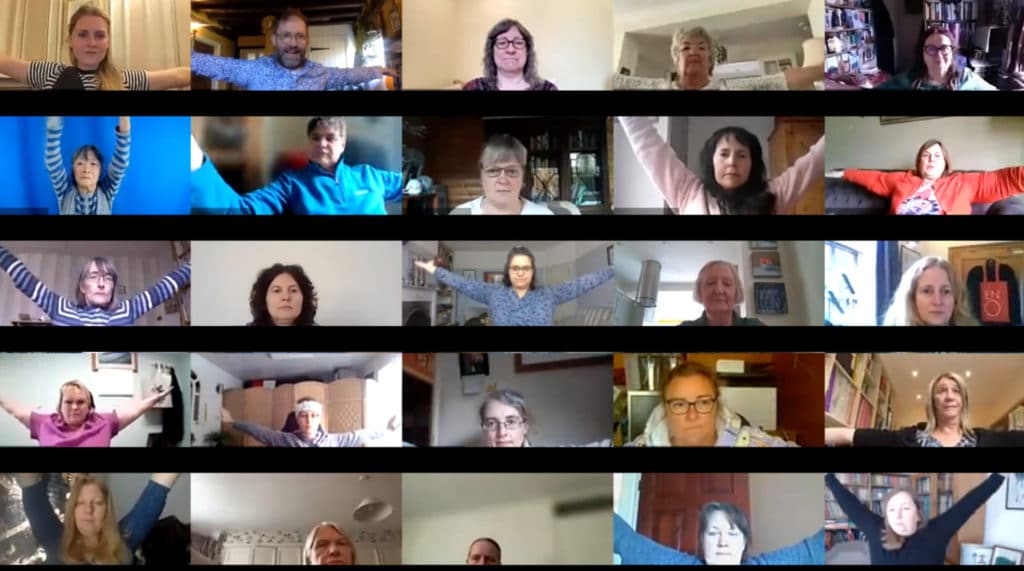COVID-19 can cause long-term illness and disability. People with long COVID commonly have breathlessness, anxiety, and reduced quality of life. Holistic approaches supporting recovery are advocated.
In a new study, scientists from Imperial College London assessed whether an online breathing and wellbeing programme called ‘ENO Breathe’ improves the quality of life and breathlessness for people recovering from COVID-19. Developed by the English National Opera (ENO) and respiratory clinicians at Imperial College Healthcare NHS Trust, the programme uses singing techniques to improve the well-being of patients with persistent breathlessness due to COVID-19.
ENO Breathe uses weekly group online sessions and digital resources, developed with the support of healthcare professionals, to empower participants with tools and techniques to improve the way they breathe and how they engage with their breathing.
Scientists assessed the program’s efficiency by conducting a clinical trial of 150 participants with ongoing breathlessness for an average of 320 days since the onset of COVID-19 symptoms. They found that ENO Breathe participants experienced a 10.48 point (out of 100) reduction in breathlessness while running compared to people who just continued with usual care alone. They also experienced a 2.42 point improvement in the mental component of quality of life, as measured by a validated online questionnaire.
These health benefits were further addressed through focus groups and surveys, which revealed that ENO Breathe participants reported improved symptoms, believed the program complemented other care they were receiving, and that singing techniques and music fitted their needs. Additional assessments of patients who attended all sessions revealed improvements in a wider variety of respiratory symptoms, anxiety, and quality of life.
For example, 40 percent of ENO Breathe participants experienced a five-point improvement in quality of life, compared with 17 percent in the usual care group. This suggests the participants who engaged most with the program got the biggest benefit. However, the physical component of quality of life did not improve more in either group.
The participants were divided into two groups: Half in the ENO Breathe group and the other half in the usual care group. Both groups were assessed after six weeks, and the control group was then offered the opportunity to participate in the program.
Scientists gathered participants’ data via online questionnaires, and their experiences were assessed using focus groups and feedback questions.
They measured mental and physical components of a validated ‘Health-Related Quality of Life’ tool that assesses key indicators of quality of life, including difficulties resulting from health problems, social impacts, pain, and impact on daily activities. The scientists also evaluated other disease impacts, including breathlessness, anxiety, and other symptoms.
The lead author of the study, Dr. Keir Phillip, Clinical Research Fellow at the National Heart and Lung Institute at Imperial College London, said: “We urgently need evidence-based treatments and interventions for people with long COVID, which currently affects approximately 1 in 50 people in the UK. Our study suggests that arts-in-health interventions can be effective tools for carefully selected participants, especially when successfully integrated with clinical services.”
“Our study suggests that the improvements in symptoms experienced by participants resulted from both practical breathing techniques learned and the creative, humane, and positive way the program is delivered.”

Senior author Dr. Sarah Elkin, consultant lead for the programme and a respiratory consultant at Imperial College Healthcare NHS Trust, said: “As we continue to recover from the impact of the pandemic, it’s vital we find ways to support people with long COVID who are experiencing debilitating symptoms long after recovering from their initial COVID-19 infection. It is essential to build an evidence base for programs such as ENO Breathe, so we can continue to understand how best to support people with long COVID and make improvements that can lead to better outcomes.”
Professor Nicholas Hopkinson, co-senior author and Professor of Respiratory Medicine at Imperial College London said: “Breathlessness is one of the most common symptoms that people with long COVID experience. The ENO Breathe program is designed to help people with the condition learn how to control their breathing better. Our research shows that it is effective, and the program has already benefitted more than 1000 people recruited from post-COVID clinics across the UK.”
Dr. Harry Brunjes, Chair of the English National Opera, said: “We are extremely proud that ENO Breathe has been evidenced to aid the recovery of the people with long-covid it has been designed to help. Research like this demonstrates the enormous benefit the arts can have when applied in a medical context. We’re enormously grateful to our partners at Imperial College Healthcare NHS Trust for their dedicated work in developing this programme with us and to Imperial College’s phenomenal team for their painstaking research.”
James Sanderson, CEO of The National Academy for Social Prescribing (NASP), said: “At NASP we believe that social prescribing can transform people’s health, so it is exciting to see clinical evidence published which demonstrates the effectiveness of a social prescribing programme. We are delighted to be able to support ENO’s ‘Breathe’ classes that are improving the lives of hundreds of people living with long COVID.”
Journal Reference:
- Keir E J Philip, MRCP et al. An online breathing and wellbeing programme (ENO Breathe) for people with persistent symptoms following COVID-19: a parallel-group, single-blind, randomised controlled trial. DOI: 10.1016/S2213-2600(22)00125-4


